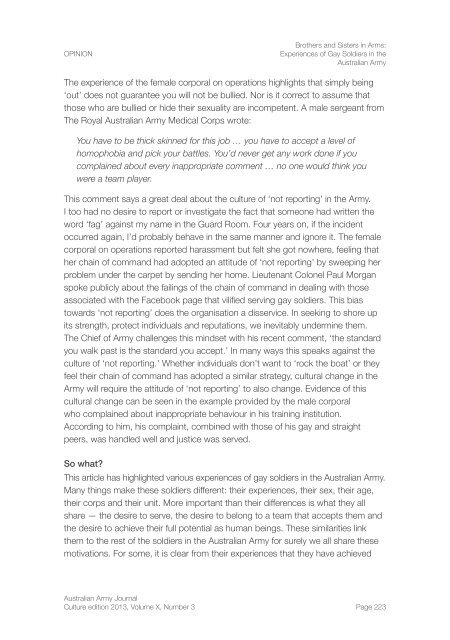Australian Army Journal
Australian Army Journal
Australian Army Journal
Create successful ePaper yourself
Turn your PDF publications into a flip-book with our unique Google optimized e-Paper software.
OPINION<br />
Brothers and Sisters in Arms:<br />
Experiences of Gay Soldiers in the<br />
<strong>Australian</strong> <strong>Army</strong><br />
The experience of the female corporal on operations highlights that simply being<br />
‘out’ does not guarantee you will not be bullied. Nor is it correct to assume that<br />
those who are bullied or hide their sexuality are incompetent. A male sergeant from<br />
The Royal <strong>Australian</strong> <strong>Army</strong> Medical Corps wrote:<br />
You have to be thick skinned for this job … you have to accept a level of<br />
homophobia and pick your battles. You’d never get any work done if you<br />
complained about every inappropriate comment … no one would think you<br />
were a team player.<br />
This comment says a great deal about the culture of ‘not reporting’ in the <strong>Army</strong>.<br />
I too had no desire to report or investigate the fact that someone had written the<br />
word ‘fag’ against my name in the Guard Room. Four years on, if the incident<br />
occurred again, I’d probably behave in the same manner and ignore it. The female<br />
corporal on operations reported harassment but felt she got nowhere, feeling that<br />
her chain of command had adopted an attitude of ‘not reporting’ by sweeping her<br />
problem under the carpet by sending her home. Lieutenant Colonel Paul Morgan<br />
spoke publicly about the failings of the chain of command in dealing with those<br />
associated with the Facebook page that vilified serving gay soldiers. This bias<br />
towards ‘not reporting’ does the organisation a disservice. In seeking to shore up<br />
its strength, protect individuals and reputations, we inevitably undermine them.<br />
The Chief of <strong>Army</strong> challenges this mindset with his recent comment, ‘the standard<br />
you walk past is the standard you accept.’ In many ways this speaks against the<br />
culture of ‘not reporting.’ Whether individuals don’t want to ‘rock the boat’ or they<br />
feel their chain of command has adopted a similar strategy, cultural change in the<br />
<strong>Army</strong> will require the attitude of ‘not reporting’ to also change. Evidence of this<br />
cultural change can be seen in the example provided by the male corporal<br />
who complained about inappropriate behaviour in his training institution.<br />
According to him, his complaint, combined with those of his gay and straight<br />
peers, was handled well and justice was served.<br />
So what?<br />
This article has highlighted various experiences of gay soldiers in the <strong>Australian</strong> <strong>Army</strong>.<br />
Many things make these soldiers different: their experiences, their sex, their age,<br />
their corps and their unit. More important than their differences is what they all<br />
share — the desire to serve, the desire to belong to a team that accepts them and<br />
the desire to achieve their full potential as human beings. These similarities link<br />
them to the rest of the soldiers in the <strong>Australian</strong> <strong>Army</strong> for surely we all share these<br />
motivations. For some, it is clear from their experiences that they have achieved<br />
<strong>Australian</strong> <strong>Army</strong> <strong>Journal</strong><br />
Culture edition 2013, Volume X, Number 3 Page 223

















